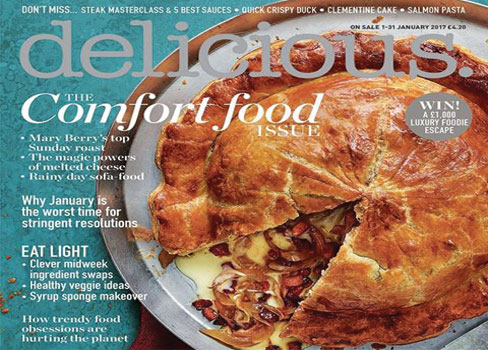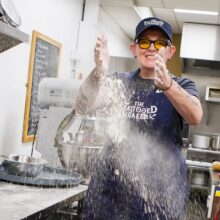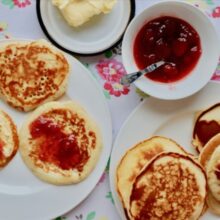Delicious opportunity for Northern Ireland food firms

Top British food magazine Delicious is encouraging Northern Ireland’s artisan and smaller food companies to bid for recognition in its annual Produce Awards (http://www.deliciousmagazine.co.uk/stories/about-the-delicious-produce-awards/). Entries open on 16th January.
The widely read magazine among foodies is on a mission to search out and champion local food heroes, the creators of the United Kingdom’s best food.
Following last year’s successful launch of the Delicious Produce Awards, the competition is back, and promising to be even bigger and better. The aim of the awards, run in association with home appliance company Fisher and Paykel, is to search out and celebrate small-scale, artisan producers from throughout the UK.
From the tip of Scotland to Northern Ireland and the Scilly Isles, it’s the country’s farmers, fishermen, butchers and artisan food producers who supply markets and fill cupboards with quality ingredients – and it’s these that inspire us to cook the best food we can.
Delicious wants producers to enter produce and products they’re proud to make, grow and create, and readers to nominate food that’s worthy of an award. There is no charge for nominating, and everyone who nominates a producer will be entered into a prize draw to win a Fisher & Paykel fridge freezer worth £1,829.99!
Last year the magazine unearthed some fantastic food stories. Look out for in-depth stories on all the 2016 Produce Awards winners throughout 2017 in Delicious. magazine
Check out the Terms and Conditions on the Delicious website before entering to make sure that you fit the criteria for the Awards. There is an entry fee of £75 for each item that you’re entering to cover costs and to ensure the business benefits from maximum publicity if it makes it onto the regional shortlist.
There are eight separate categories in the Produce Awards; under two headings: primary and artisan.
PRIMARY
Includes quality ethically* produced ingredients, grown with respect for the land, reared with care in the field, or sustainably sourced from our waters.
• From the dairy
Dairy produce made with demonstrable regard for the behavioural and physical welfare of animals on British farms, including sufficient grazing pasture; traceability of produce. Examples: organic milk, cream, goat’s milk
• From the earth
Ethically grown or foraged British crops that reflect a healthy respect for the land and its natural seasonal cycles, made in a manner that minimises pollution and waste to the environment. Examples: grains and flours, seeds, pulses, fruits, vegetables, herbs and foraged foods
• From the field
Animals and birds bred for the table and reared with a high regard for their physical and emotional welfare, raised on pasture or land suitable for grazing or foraging and humanely slaughtered. Honey should be traceable to a single region. Examples: meat, poultry and game, honey, eggs
• From the sea
Responsibly sourced seafood caught in British waters, either wild fish and shellfish, or fish/shellfish reared on environmentally responsible farms. This category also includes samphire, purslane, edible seaweed varieties and other ‘sea vegetables’. Examples: wild or ethically farmed seafood; sea vegetables
ARTISAN
This category is for products made in the UK, using largely British-grown or reared, ethically raised* produce. The process can be as simple a process as churning butter from British milk, making soup with home-grown ingredients, or selling Lancashire hot pots made with local meat.
The awards also recognise the UK’s diverse communities and the food that consumers love to eat – Caribbean curries, Chinese dim sum, Indian snacks, Italian sauces, and French patisserie for example.
Ingredients for artisan products can be sourced from further afield if not readily available in the UK. For example, eligible entries will include the likes of tapenade made with Mediterranean olives, Asian-spiced pickles, or marmalade prepared with Spanish oranges. Traceability of ingredients should be transparent and ethical business practices adhered to (see below).
• From the dairy
Foods that qualify for this category include freshly churned butter, buttermilk, yogurt and local cheese varieties. It can also include branded items that use dairy products as a key ingredient. Examples: butter, garlic butter, junket, custard tarts
• From the earth
Products made from ingredients based on ethically* grown crops. Examples: artisan bread and bakery products; preserves and dishes made with locally grown fruit and vegetables; oils such as rapeseed; hedgerow harvests transformed into retail items (perhaps a wild garlic dressing, wild berry puddings, and other ready-to-eat prepared items). PLEASE NOTE: Fruit and vegetable juices will be eligible for entry but alcoholic beverages will not be considered.
• From the field
Meat or poultry-based items made with sound ethics and craftsmanship. Examples: dry-cured bacon and sausages, terrines, smoked meats, pies, casseroles, curries, scotch eggs, ready-to-heat or eat dishes.
• From the sea
Fish or seafood-based items using quality raw ingredients. Examples: preserved and prepared seafood, including potted shrimps, smoked kippers, pâté and prepared dishes in which the main ingredient is British-caught. Specialist sea salt and items made with predominantly sea vegetables, such as samphire and edible seaweed are also eligible.
If a produce/product is shortlisted by the regional judges in March 2017, the following benefits apply:
• PR mentoring for your business by the official PR company for the delicious. Produce Awards 2017.
• An editorial entry on the Produce Awards website, which attracts hundreds of thousands of visitors every month. The entry will include information about business activities, products, contact details, images (provided by the shortlisted business) and a link to your website.
• If a business is a winner in its category, there will be extensive coverage in delicious. magazine and press coverage.








